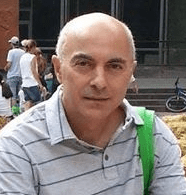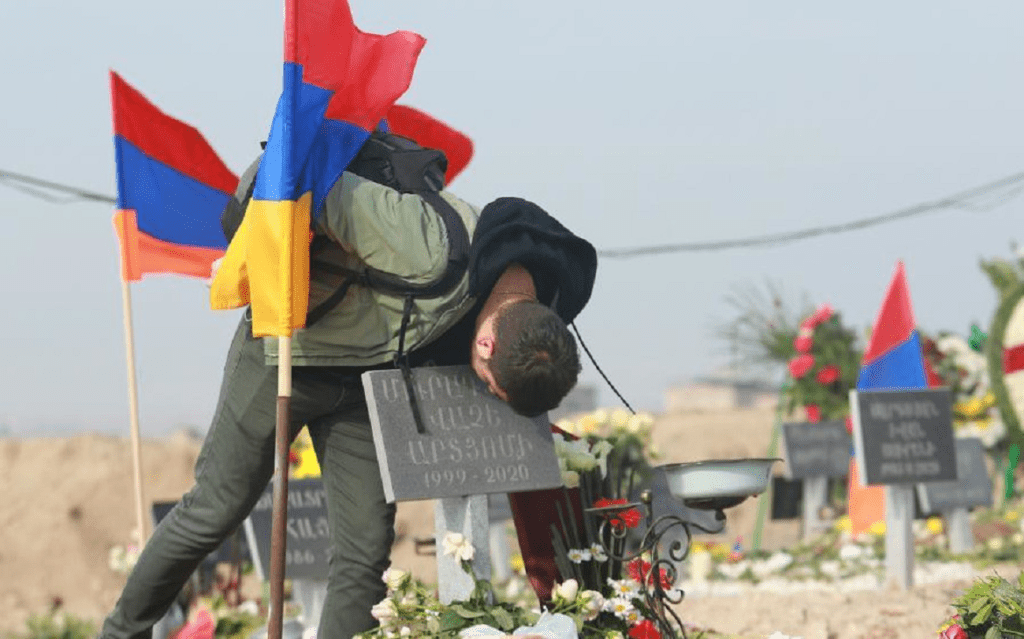By David Davidian
Does Armenia need an army? Perhaps not — if Armenia had no external enemies, no collective interests requiring protection, and international relations were unlike ruthless schoolyard dynamics.

During the collapse of the Soviet Union, constituent captive nations needed to choose or create political and societal identities replacing that from the Soviet era. Most of these states were under the strong influence of western institutions, investments, and social policies (monetary, health, education, etc.). Considering Marxist-Leninism lost, “Shock therapy” was instituted by the west. The result was Cowboy Capitalism and the formation of powerful oligarchs, being the culmination of weak controls on the personal accumulation power in its many forms, previously the purview of the Soviet command economy. Many oligarchs learned their stock in trade under the notoriously corrupt Soviet system where stealing from the state was not considered “stealing.” At the collapse of the Soviet Union, there was comparatively more to loot. Every newly emerged state had its unique characteristics. Universal at the disintegration of the Soviet Union were rather crude forms of nationalism. Volumes have been written about this. The competing forces in the newly emerged Republic of Armenia are of particular interest, viewed from a high level.
The last Armenian kingdom fell nearly nine hundred years ago, leaving no continuity of diplomacy that once stretched from Jerusalem to Italy. In the early 1990s, post-Soviet Armenia deliberately chose a policy based on anointed oligarchs, many being members of Parliament, some with Mafioso-like nicknames. The two competing ideologies were a benign nationalism, without much of plan, and an oligarchy whose command of the economy created societal reference points in their image — the accumulation of power and working the selective enforcement of laws.
While some of these conditions exist in many third-world countries, Armenia’s geopolitical situation demanded that the society not base all human interaction on monetary transactions. Local competitive economic forces can prevail in countries with effective self-defense strategies and reasonable law enforcement. In Armenia, competitive forces were strongly stifled. Armenia’s supposed nationalist leaders after Levon Ter-Petrosyan, Robert Kocharyan and Serge Sargsyan, both from Nagorno-Karabakh, were Armenia’s most prominent oligarchs. Their alignment with Russia’s Putin may have given Armenian leaders the illusion of power and protection.
The policies of Armenia’s first president, Levon Ter-Petrosyan, were based on the assumption that Armenia could not be more than a regional backwater with an economy based on small shop owners. As a state, it must come to an accommodation with its neighbors. At what cost must acquiescence to Turkey, who threatened Armenia as early as 1993, be accomplished? Turkey has consistently demanded Armenia end its historic national mandate, which at a minimum was the Turkish recognition of their genocide of the Armenians. Levon Ter-Petrosyan’s devastating pronouncements (in the printed media at the time) against Armenia’s unique diaspora left a generation of the best and brightest withering on the vine. Constitutionally, articles 48, 148, 124, 165, 174, and 177 effectively restrict those serving in critical positions in the Armenian government to locals. While this may seem reasonable on the surface, the result is that no diasporan Armenians can have any role in governance. In the 21st century, individuals can easily be vetted and undergo necessary background checks. Of course, as characterized in organizational dynamics, incumbents don’t want the best and brightest undermining their positions.
The formation of today’s Armenian Army was based on self-defense militias in both Armenia, Nagorno-Karabakh, and the remnants of Soviet Armenian forces. This consolidation can be attributed to Vazgen Sargsyan. He rose to prominence in the late 1980s, leading Armenian volunteer groups in battles with Azerbaijani forces. Appointed defense minister by President Levon Ter-Petrosyan, Vazgen Sargsyan became the most prominent commander of the Armenian armed forces. In different positions, he regulated the military operations in the First Karabakh War until 1994, when a ceasefire was reached.
Vazgen Sargsyan tightened his grip on the Armed Forces of Armenia, establishing himself as Armenia’s virtual strongman. After supporting Ter-Petrosyan in the 1996 elections, he forced Levon Ter-Petrosyan out of office in 1998 due to the latter’s support for concessions in the Nagorno-Karabakh settlement negotiations. Subsequently, Vazgen Sargsyan helped Robert Kocharyan to be elected president. After his relations with Prime Minister Robert Kocharyan deteriorated, Vazgen Sargsyan joined forces with Armenia’s ex-communist leader Karen Demirchyan. Vazgen Sargsyan became prime minister, emerging as the de facto military and legislative decision-maker in Armenia.
Vazgen Sargsyan, Karen Demirchyan, and several others were assassinated in the Armenian Parliament in October 1999. The perpetrators were sentenced to life in prison. However, the distrust toward the trial process spawned conspiracy theories. The leading hypothesis claims the assassination was masterminded by Robert Kocharyan and National Security Minister Serzh Sargsyan. Serzh Sargsyan became Armenia’s third president, eleventh, and fifteenth prime minister. Much of this sounds like Game Of Thrones, but none of the players commanded fire-breathing dragons.
In 2018, Nikol Pashinyan came to power based on the deception that he was an anti-corruption and anti-oligarch populist. Yet nothing was done to create the institutions that demanded the most vigorous military defense possible, still characterized by a strong separation between the defense establishment and the people. Armenia is surrounded by powers that can take advantage of Armenia’s unwillingness to consider that its survival should not be predicated on the goodwill of others. Considering any option other than a reliance on Russia would necessitate creating a strategic national vision and ultimately a grand strategy. The latter is not defined by transactional diplomatic, military, and economic activity but requires planning not in the immediate interest of those who stand to gain from transactional corruption. Russia would have more respect for Armenia if it could better defend itself, not unlike picking a more muscular friend during a schoolyard altercation. Any long-term plan all-too-conveniently rings of a failed communist past. In sharp contrast, states such as Israel look out a couple of generations in strategic planning.
With Russia deferring to specific Turkish interests, hoping to create a fissure between Turkey and NATO, newly elected Pashinyan took certain anti-Kremlin positions. Armenia was still unable to reconcile itself with changing regional dynamics. It is no surprise that Armenia was never able to prepare itself for a war with Azerbaijan over Nagorno-Karabakh. Further, in what appears to be an engineered Second Karabakh War defeat, Pashinyan changed Ministers of Defense four times, and six other officials suspiciously died.
In reality, Pashinyan was against the few big oligarchs that put him into jail a decade earlier while catering to a new class of oligarchs waiting behind the scenes to sign business contracts with Turks and Azerbaijanis. Pashinyan is jailing judges and mayors of border towns and villages on the Azerbaijani frontiers. Over the past thirty years, Armenia never built an indigenous defense infrastructure, never created activist diplomacy, and relegated the Armenian diaspora to a competitor. On May 1, 2018, Pashinyan said in a speech,
“I don’t consider myself a liberal. In the modern world, ‘isms’ have lost the meanings they used to have,” he said. “Now is the era of securing a person’s happiness, and it’s not the ‘isms’ but people’s happiness and freedom that matter.”
Pashinyan’s lack of statecraft (and those preceding him) has placed Armenia at the whims of stronger regional powers. Either Armenia forges its destiny, the hard road, or Armenia concedes to the only other option.
It was Levon Ter-Petrosyan, leader of the Karabakh Committee in 1988, stated as late as December 2016 [in translation],
“In a word, in our case, the program of building a “nation-army” is an unfortunate, ill-considered, dangerous program, the only result of which will be the promotion of emigration and the final eviction of Armenians from Armenia and Karabakh.”
The context for this quote:
– Armenian security is not on the order of Israel or even the Swiss.
– The only external enemy Armenia has is Azerbaijan.
– Turkey has never attacked Armenia.
Levon Ter-Petrosyan believes a “serious” army will provoke the wrath of Armenia’s neighbors. Sun Tzu and every military strategist since would disagree.
The EU’s 2.6 billion euro post-2020 Second Karabakh War investment package for Armenia can be viewed as a reward for Armenia’s regional acquiescence. Much of the non-direct money will end up in the hands of those who “qualify” for business loans. With Azerbaijani and Turkish borders opening, Nouveau-oligarchs will rejoice while local Armenian farmers and lite-manufacturing will suffer, as is witnessed in the Republic of Georgia, north of Armenia. As Georgia’s second-largest city of Batumi with Turkish and Chinese criminal gangs laundering money as local officials look the other way, Armenia too will join the regional culture of trading sovereignty for easy money.
In sharp contrast with the prevailing policies of the ruling regime, if Armenians want peace, they need an effective army. Prussian general and military theorist Carl Von Clausewitz wrote,
“Peace is maintained by the equilibrium of forces, and will continue just as long as this equilibrium exists, and no longer.”
Yerevan, Armenia
Author: David Davidian (Lecturer at the American University of Armenia. He has spent over a decade in technical intelligence analysis at major high technology firms. He resides in Yerevan, Armenia).







